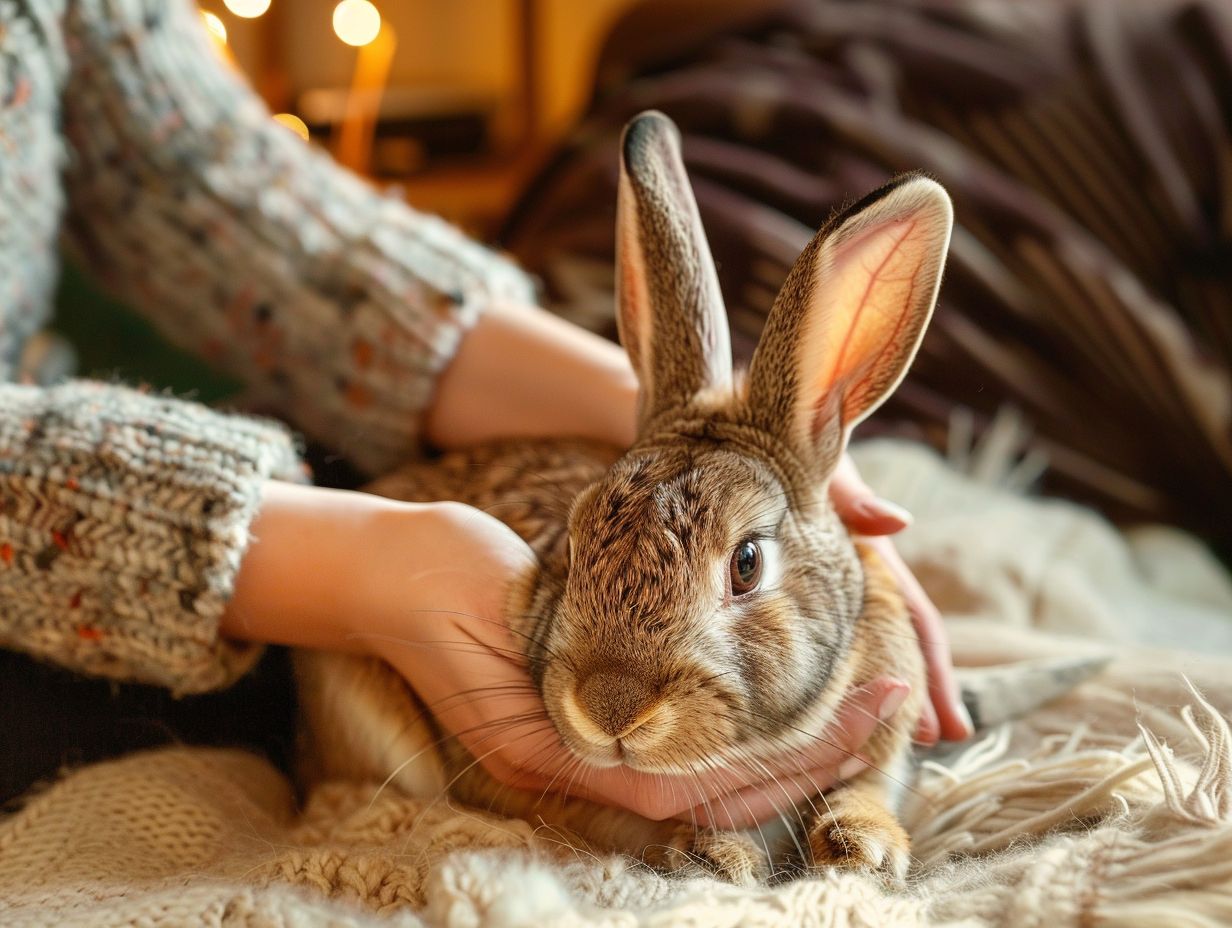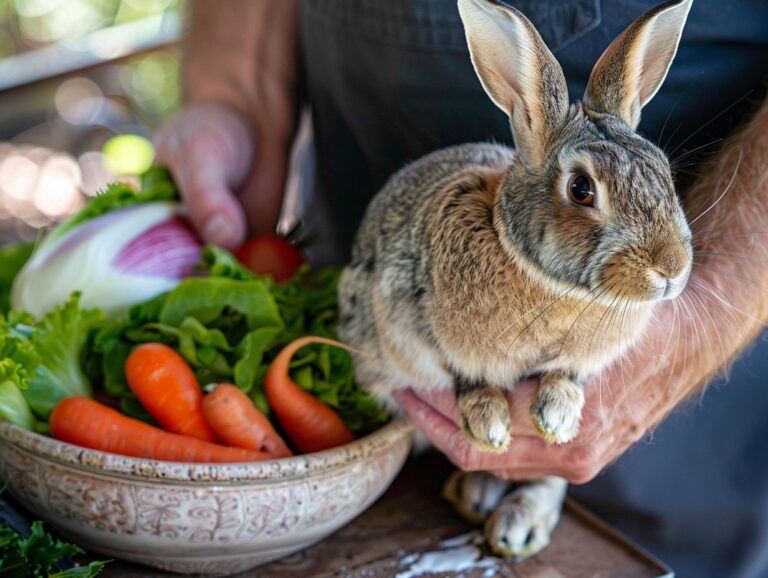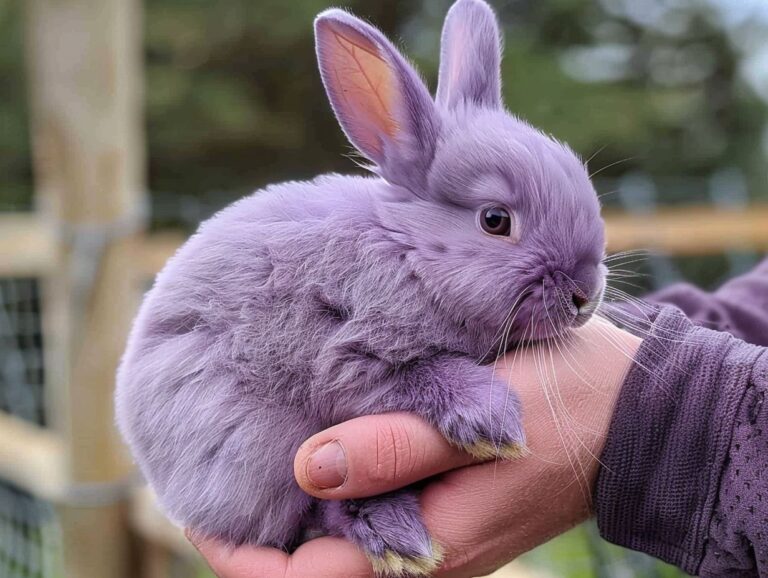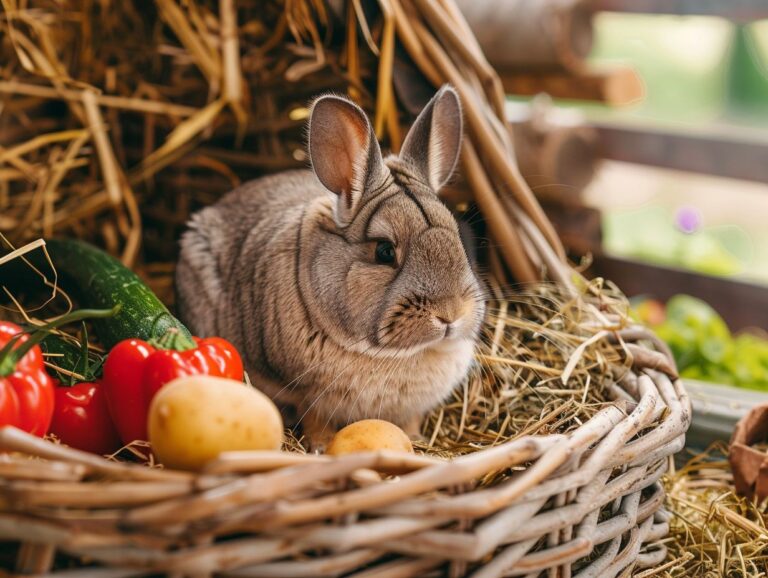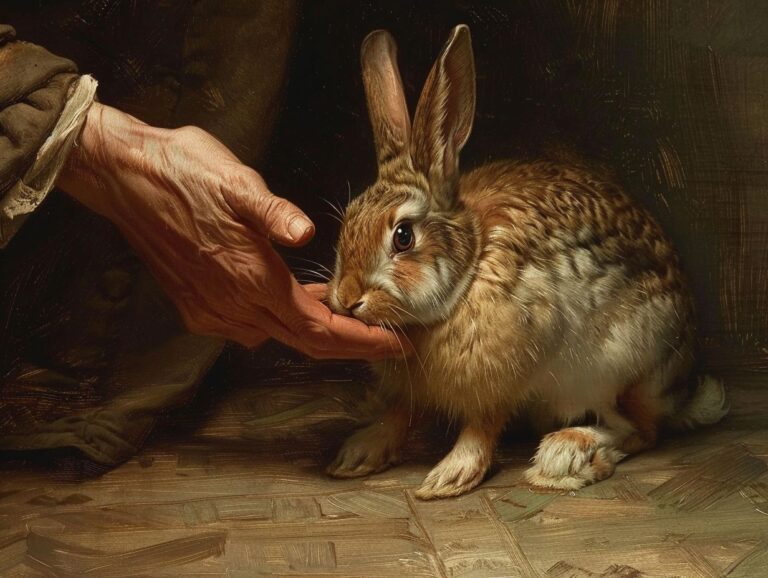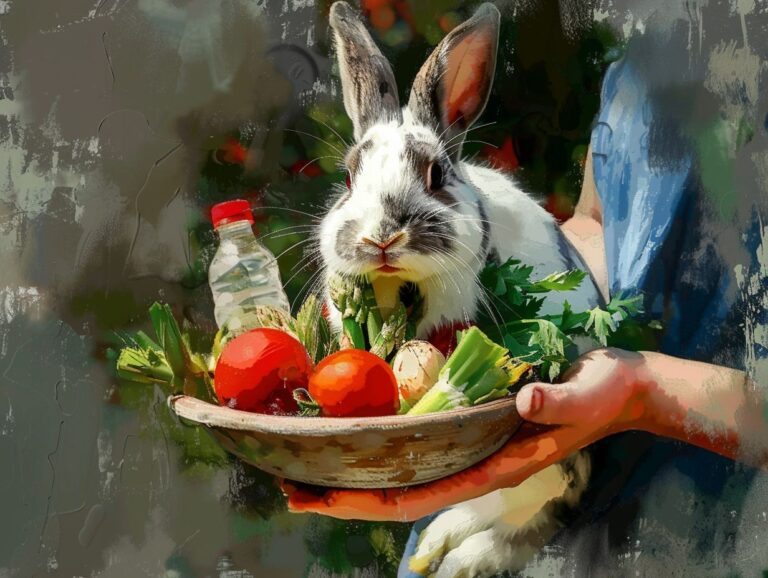Rhinelander Rabbits As Pets: Care, Diet, and Health For Medium Sized Breeds
Are you considering getting a Rhinelander rabbit as a pet?
This comprehensive article will explore everything you need to know about these medium-sized rabbits. From their average size and personality traits to their ideal diet and grooming needs, we will cover it all.
We will also discuss common health issues, how to keep them happy and healthy, and tips for bonding with these adorable pets.
Stay tuned to learn more about caring for Rhinelander rabbits!
Key Takeaways:
What Are Rhinelander Rabbits?
Rhinelander rabbits are a unique breed known for their distinctive markings and medium size. Originating in Germany, specifically in North Rhine-Westphalia, these rabbits have gained popularity for their striking appearance and friendly temperament.
These rabbits typically have a distinctive tri-colored coat pattern with a white body and colored patches around the eyes and ears. This breed is recognized for its bold and eye-catching markings, making them stand out among other rabbit breeds. Mini Lop rabbits as pets are small breeds, with an average weight ranging from 6 to 10 pounds.
The purpose of breeding Rhinelander rabbits is primarily for show purposes due to their unique coat markings and the specific breed standards set by various rabbit breeding organizations. The markings on these rabbits must meet specific criteria to adhere to the breed standard, ensuring consistency and quality among Rhinelander rabbits.
What Is the Average Size of Rhinelander Rabbits?
The average size of Rhinelander rabbits typically ranges between 6 to 9 pounds, making them medium-sized rabbits compared to other breeds. The size of these rabbits plays a crucial role in their care, diet, and living environment.
Rhinelander rabbits’ size influences not only their physical appearance but also their behavior and social interactions. As medium-sized rabbits, they require adequate space to move around comfortably and exhibit natural behaviors like hopping and digging.
- Due to their size, Rhinelander rabbits go through distinct growth patterns, reaching their full size within a few months
- Weight management is essential for maintaining their health and preventing obesity-related issues that can arise due to overfeeding or lack of exercise
- The overall well-being of Rhinelander rabbits is closely tied to their size, as it impacts their agility, ability to groom themselves, and overall quality of life
What Makes Rhinelander Rabbits Good Pets?
Rhinelander rabbits make excellent family pets due to their friendly nature, gentle temperament, and sociable personality. These rabbits are known for forming strong bonds with their owners and can be great companions for individuals and families alike.
One of the standout qualities of Rhinelander rabbits is their adaptability to different household environments. Whether living in a spacious home or a cozy apartment, these rabbits can easily acclimate and thrive. Their sociable nature makes them a joy to have around, as they enjoy interacting with both humans and other pets in the household.
Along with their friendly demeanor, Rhinelander rabbits are known for their playful and energetic personalities. They love to explore their surroundings and engage in various activities, making them entertaining companions for families looking for lively pets.
What Are the Personality Traits of Rhinelander Rabbits?
Rhinelander rabbits are known for their curious and friendly nature, making them engaging companions for pet owners. Their intelligence and playful demeanor add to their charm, and they thrive on human interaction and enrichment activities.
These rabbits have a natural inquisitiveness that drives them to explore their surroundings with boundless curiosity. Always eagerly investigating new sights and sounds, they bring a sense of adventure to any household. Their friendly disposition extends to their interactions with both humans and other pets, displaying a sociable and amicable nature. Learn more about caring for Dutch rabbits as pets.
This breed’s intelligence is evident in their ability to quickly learn new tricks and adapt to different environments. Providing them with mental stimulation through interactive toys or puzzle games not only keeps them entertained but also promotes their mental well-being.
What Are the Physical Characteristics of Rhinelander Rabbits?

With their striking butterfly-shaped markings on their noses, the Rhinelander rabbits boast an elegant and unique look. Their coats, most commonly seen in a combination of fawn and blue, create a captivating contrast of colors that add to their appeal. The distinctiveness of their markings gives them an almost regal appearance, emphasizing their graceful presence. Due to their coat’s smooth texture, Rhinelanders do not require extensive grooming, making them an ideal choice for those looking for low-maintenance pets.
How to Care for Rhinelander Rabbits?
Caring for Rhinelander rabbits involves providing a balanced diet rich in vegetables, hay, and pellets, maintaining regular grooming to ensure their coat remains healthy, offering a spacious hutch or cage for shelter, and creating an enriching environment with toys and adequate exercise opportunities.
Regarding their diet, fresh vegetables are essential to ensure they receive vital nutrients, while timothy hay aids in digestion and dental health. Pellets formulated specifically for rabbits help meet their dietary requirements, but it’s crucial not to overfeed these to prevent obesity.
In terms of grooming, regular brushing with a suitable rabbit brush keeps their coat free from mats and reduces shedding. A clean living environment is equally important, with bedding changed regularly to maintain hygiene. Learn more about caring for small breed rabbits.
Rhinelander rabbits thrive in spacious habitats where they can move around comfortably. Providing hiding spots and platforms in their enclosure promotes mental stimulation and natural behaviors. Regular exercise outside the cage is also beneficial for their overall well-being.
What Type of Living Environment Do Rhinelander Rabbits Need?
Rhinelander rabbits require a spacious living environment that includes a secure hutch or cage with ample room for movement. Their living space should be well-ventilated, clean, and enriched with toys and hiding spots to cater to their natural behaviors.
The hutch or cage for Rhinelander rabbits should be equipped with a solid flooring to prevent injuries and provide comfort. It’s crucial to have a dedicated area for feeding and drinking, ensuring they have access to fresh food and water at all times. Proper bedding material such as hay or straw should be provided for insulation and to encourage natural burrowing instincts. Regular cleaning and maintenance of the hutch are essential to prevent bacterial growth and maintain a hygienic living space for the rabbits.
What Is the Ideal Diet for Rhinelander Rabbits?
The ideal diet for Rhinelander rabbits consists of a combination of fresh vegetables, high-quality hay such as timothy hay, and balanced rabbit pellets. These dietary components provide essential nutrients and fiber necessary for their digestive health and overall well-being.
Regarding vegetables, leafy greens like romaine lettuce, kale, and parsley are excellent choices for Rhinelander rabbits. These veggies not only offer vital vitamins and minerals but also help with hydration.
Timothy hay should make up the bulk of their diet, aiding in proper digestion and wearing down their teeth naturally. Consider Holland Lop rabbits for smaller breeds.
Portion sizes are crucial for maintaining a healthy weight in Rhinelander rabbits. Owners should follow feeding guidelines based on the rabbit’s weight to prevent obesity or malnutrition. It is recommended to provide about 1/4 cup of pellets per 5 pounds of body weight daily, along with unlimited access to hay and a variety of fresh veggies.
What Are the Grooming Needs of Rhinelander Rabbits?
Rhinelander rabbits have a sleek coat that requires regular grooming to prevent matting and maintain skin and coat health. Grooming sessions should include brushing, nail trimming, and checking for any signs of skin issues to ensure the rabbit’s well-being.
Grooming a Rhinelander rabbit involves using specific tools such as a slicker brush to remove loose fur and prevent tangling. A small pair of pet nail clippers is essential for keeping their nails at an appropriate length to avoid discomfort or injury. It is recommended to establish a grooming routine at least once a week, but this can vary depending on the individual rabbit’s coat type and shedding season.
What Are the Common Health Issues of Rhinelander Rabbits?

Rhinelander rabbits are generally hardy and resilient, but they may be susceptible to certain health issues such as dental problems, obesity, and gastrointestinal stasis. Understanding the common health issues that affect Rhinelander rabbits can help in early detection and timely intervention.
One of the significant health concerns among Rhinelander rabbits is related to their dental health. Due to their herbivorous nature, they have continuously growing teeth, which can lead to dental abnormalities if not worn down properly through chewing on fibrous foods.
Weight management is another critical aspect for Polish rabbits as pets as they have a tendency to overeat if not provided with a balanced diet and sufficient exercise. Obesity can lead to various health issues, including joint problems and heart conditions.
Digestive disorders such as gastrointestinal stasis are common in silver rabbits as pets. This condition occurs when their gut motility slows down, often due to a lack of fiber in their diet, leading to potentially serious health complications.
Rhinelander rabbits have an average lifespan of 5 to 8 years, and it’s important to consider gender-specific health factors, such as the higher risk of urinary tract infections in males. Regular veterinary check-ups and a proper diet tailored to their specific needs can help in maintaining their health and well-being.
How to Identify and Treat Common Health Issues in Rhinelander Rabbits?
Identifying and treating common health issues in Rhinelander rabbits requires regular health check-ups, monitoring their diet and weight, recognizing early symptoms of potential illnesses, and seeking veterinary care promptly when needed. It’s essential to be proactive in maintaining your rabbit’s health and well-being.
One of the key aspects of ensuring your Rhinelander rabbit stays healthy is to provide a balanced diet rich in fiber, fresh hay, leafy greens, and limited pellets to maintain their digestive health.
Additionally, regular exercise is crucial to prevent obesity and related health issues, so ensure your rabbit has ample space to hop and play. Learn more about caring for tan rabbits as pets.
Observing their behavior closely can help in detecting any changes that may indicate underlying health concerns, such as dental issues or parasitic infestations.
How to Keep Rhinelander Rabbits Happy and Healthy?
Ensuring the happiness and health of Rhinelander rabbits involves providing ample opportunities for exercise, offering a balanced diet rich in nutrients, creating an enriching environment with toys and mental stimulation, and establishing a strong bond through regular interaction and training.
Regarding exercise routines for Rhinelander rabbits, it’s essential to allow for free-roaming time in a safe and secure space where they can hop and explore. Incorporating interactive toys like tunnels, balls, and chew toys can keep them physically active and mentally engaged.
As for their diet, a combination of hay, fresh vegetables, and high-quality pellets is necessary to meet their nutritional needs. Avoiding sugary treats and providing fresh water daily is vital for Belgian hare rabbits care.
Creating a stimulating environment means offering hiding spots, platforms to climb on, and even cardboard boxes for their curiosity. This enriching space contributes to their mental well-being and prevents boredom.
Bonding activities such as grooming sessions, gentle petting, and interactive playtime not only strengthen the bond between rabbits and their owners but also foster a sense of security and happiness in these sociable creatures.
What Are Some Fun Activities to Do with Rhinelander Rabbits?
Engaging in fun activities with Rhinelander rabbits can include teaching them tricks, providing toys for mental stimulation, setting up obstacle courses for exercise, and creating a safe outdoor play area for supervised exploration. These activities not only keep rabbits physically active but also strengthen the bond with their owners.
Teaching tricks to Rhinelander rabbits can improve their cognitive abilities and mental agility while providing them with a sense of accomplishment. Introducing new toys sparks their curiosity, prevents boredom, and encourages problem-solving skills. Designing stimulating environments and obstacle courses not only ensure physical fitness but also prevent obesity and promote overall well-being. All these activities contribute to a happy, healthy life for Rhinelander rabbits, fostering their natural behaviors and enhancing their quality of life.
How Often Should Rhinelander Rabbits Be Taken to the Vet for Check-ups?
Regular veterinary check-ups are essential for Rhinelander rabbits to monitor their health, address any potential issues early on, and ensure preventive care measures are in place. Both male and female rabbits should receive yearly check-ups, with additional visits as needed based on their health status and age.
During these visits, the veterinarian will conduct a thorough physical examination, checking for signs of dental issues, respiratory problems, parasites, and any other health concerns specific to Rhinelander rabbits. Preventive care measures such as vaccinations and parasite control will be discussed and implemented. As rabbits age, the frequency of check-ups may need to increase to catch age-related health issues early. It is crucial to establish a good relationship with a rabbit-savvy veterinarian who understands the unique needs of Rhinelander rabbits.
What Are Some Tips for Bonding with Rhinelander Rabbits?

One practical tip for bonding with Rhinelander rabbits is to engage in trust-building exercises such as hand-feeding them their favorite treats to associate your presence with positive experiences. Incorporating gentle petting sessions and speaking to them in a soothing tone can help them feel more comfortable and secure around you. By consistently showing them patience and understanding, you can build a strong foundation of trust that will strengthen your bond over time.
Frequently Asked Questions
What is the ideal weight range for Rhinelander rabbits?
The ideal weight range for Rhinelander rabbits, as a medium sized breed, is between 6 to 9 pounds.
What kind of care do Rhinelander rabbits require?
Rhinelander rabbits require daily care, including providing fresh food and water, cleaning their living space, and regular grooming.
What should I feed my Rhinelander rabbit?
Rhinelander rabbits have a specific diet that includes hay, fresh veggies and fruits, and a small amount of pellets. It is important to avoid feeding them foods that are harmful to rabbits, such as chocolate or dairy products.
Do Rhinelander rabbits have any specific health concerns I should be aware of?
Rhinelander rabbits are generally healthy, but like all rabbits, they can be prone to dental issues and obesity. Regular check-ups with a veterinarian are recommended to ensure their overall health and well-being.
Is it recommended to keep Rhinelander rabbits as indoor or outdoor pets?
It is recommended to keep Rhinelander rabbits as indoor pets, as they are sensitive to extreme temperatures and can easily get stressed in outdoor environments. However, they can also be trained to use a litter box, making them suitable for indoor living.
Can Rhinelander rabbits live with other pets?
Rhinelander rabbits can live with other pets, such as cats and dogs, as long as they are properly introduced and supervised. It is important to ensure the safety of both the rabbit and the other pets in the household.

